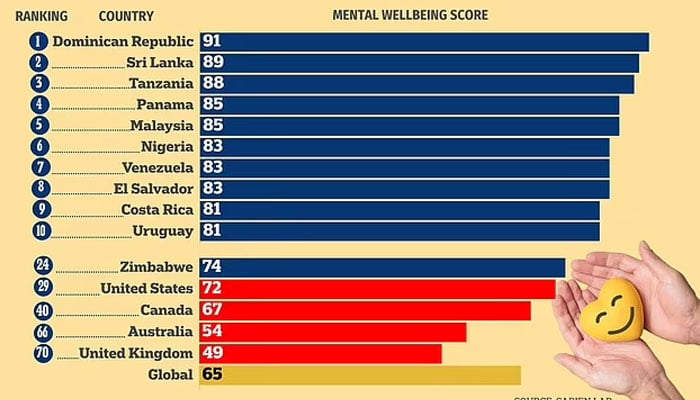A recently highlighted global report has identified Uzbekistan as the only nation reporting lower well-being than the United Kingdom, which ranked 70th out of 71 countries for mood, life outlook, and self-esteem in 2023, Daily Mail reported.
According to the report, the Dominican Republic claimed the top spot in the world wellbeing charts, with the UK scoring 49 on the mental wellbeing scale, significantly below the global average of 65.
Researchers from US-based think tank Sapien Labs attribute the decline in mental health in Western nations, including the UK, to various factors exacerbated by the pandemic. These factors include addiction to mobile phones, increased fast food consumption, erosion of social connections, and the surge in remote work.

The study, based on data from over 50,000 respondents across 71 countries, indicates a worrying picture of post-pandemic mental wellbeing, with no signs of recovery five years on.
Younger populations, especially those under 35, experienced the most significant decline in mental well-being during and after the pandemic.
The report highlights the correlation between national wealth indicators, per capita GDP, and average mental well-being scores. The decline in mental well-being was observed across English-speaking countries, with an eight per cent drop between 2019 and 2020 and a subsequent three per cent decline in 2021.
Notably, the Dominican Republic, Sri Lanka, and Tanzania topped the well-being rankings, while Tajikistan, Brazil, South Africa, the UK, and Uzbekistan were among the bottom five. The researchers emphasise the importance of understanding the diverse factors influencing collective mental well-being.
According to the report, Pakistan ranked 16th worst country in terms of mental well-being while India is 59th worst.
Factors contributing to lower mental well-being include early exposure to smartphones, frequent consumption of ultra-processed food, and strained family relationships.
The average age of smartphone ownership and the quality of dietary choices impact mental health outcomes, with processed food consumption linked to symptoms of depression and emotional issues.
While the study challenges common perceptions about the positive relationship between wealth and well-being, it underscores the need for a comprehensive understanding of the complexities involved in assessing mental health on a global scale.

